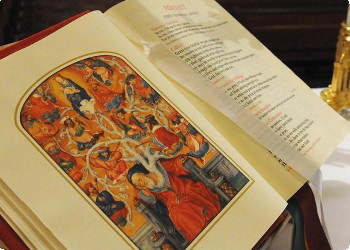A strong wind was blowing
13 APRIL (Jn 6,16-21)
Creator of the winds is God. He uses these to realize his will, which is often of judgment on the nations and Israel itself. “He makes the winds His messengers, Flaming fire His ministers.” (Psalm 104: 4). “He causes the vapors to ascend from the ends of the earth; Who makes lightnings for the rain, Who brings forth the wind from His treasuries.” (Psalm 135: 7). “There are storm winds created to punish, which in their fury can dislodge mountains; When destruction must be, they hurl all their force and appease the anger of their Maker.” (Sir 39, 28). “Him who formed the mountains, and created the wind, and declares to man his thoughts; Who made the dawn and the darkness, and strides upon the heights of the earth: The Lord, the God of hosts by name” (Am 4, 13). Two historical facts attest to all the omnipotence of government that God has over winds: the passage of the Red Sea and the furnace of Babylon, where Daniel and his companions had been placed to be burnt.
Then the Lord said to Moses, “Why are you crying out to me? Tell the Israelites to go forward. And you, lift up your staff and, with hand outstretched over the sea, split the sea in two, that the Israelites may pass through it on dry land. But I will make the Egyptians so obstinate that they will go in after them. Then I will receive glory through Pharaoh and all his army, his chariots and charioteers. The Egyptians shall know that I am the Lord, when I receive glory through Pharaoh and his chariots and charioteers.” The angel of God, who had been leading Israel’s camp, now moved and went around behind them. The column of cloud also, leaving the front, took up its place behind them, so that it came between the camp of the Egyptians and that of Israel. But the cloud now became dark, and thus the night passed without the rival camps coming any closer together all night long. Then Moses stretched out his hand over the sea, and the Lord swept the sea with a strong east wind throughout the night and so turned it into dry land. When the water was thus divided, the Israelites marched into the midst of the sea on dry land, with the water like a wall to their right and to their left. The Egyptians followed in pursuit; all Pharaoh’s horses and chariots and charioteers went after them right into the midst of the sea. (Ex 14,15-23).
Now the king’s men who had thrown them in continued to stoke the furnace with brimstone, pitch, tow, and faggots. The flames rose forty-nine cubits above the furnace, and spread out, burning the Chaldeans nearby. But the angel of the Lord went down into the furnace with Azariah and his companions, drove the fiery flames out of the furnace, and made the inside of the furnace as though a dew-laden breeze were blowing through it. The fire in no way touched them or caused them pain or harm.(Dn 3,46-50).
Jesus comes to meet the disciples, walking on the sea. He approaches the boat. The disciples are afraid. Jesus reassures them: “It is I, do not be afraid.” They take him on the boat, and immediately the boat reaches the shore they were going to. Jesus is revealed to them as the Lord of the sea, the winds and the storm; the Lord of every power that exists in nature. This obeys him in his every desire. He does not even have to give it orders. It understands and executes the wishes of its Lord. The divinity of Jesus seems so obvious. He carries out the works that are only of God and do not belong to human nature.
When it was evening, his disciples went down to the sea, embarked in a boat, and went across the sea to Capernaum. It had already grown dark, and Jesus had not yet come to them. The sea was stirred up because a strong wind was blowing. When they had rowed about three or four miles, they saw Jesus walking on the sea and coming near the boat, and they began to be afraid. But he said to them, “It is I. Do not be afraid.” They wanted to take him into the boat, but the boat immediately arrived at the shore to which they were heading.
Jesus uses every event, circumstance, time to talk to his disciples of himself. Sometimes he does it with words, other times with works. He often does it both with words and works. In this circumstance he speaks to them only with works. They, the disciples are not able to move forward. They go neither forward nor backward and it is twelve of them. As soon as Jesus is on the boat, this instantly reaches the shore. There is in this man the supreme government of the forces of nature and this government is only of God. Jesus in his nature is Other than what one sees. This is revealed by his works. It is said by what He does.
Virgin Mary, Mother of the Redemption, Angels and Saints teach us the mystery of Jesus.





